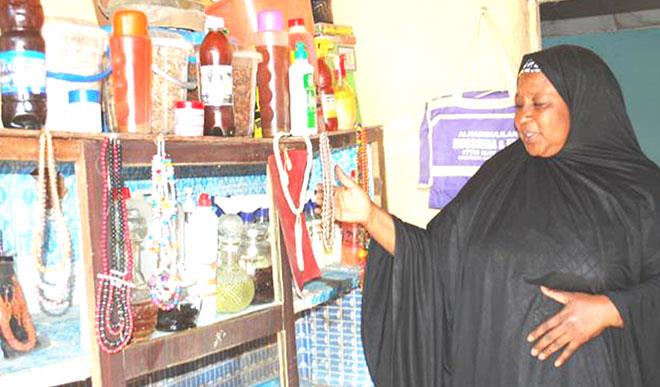
In Zaria, she is regarded as jack of all trades – and master of all. From an early age, Hajiya Aishatu Bala Ahmed had developed interest in entrepreneurship. As she grew up, she strove to acquire the necessary business skills to sharpen her interest.
Today, Hajiya Ahmed, popularly known as Hajiya Sarauniya, owns Hasba Company Limited and Himma dai Mata, two firms that deal in various crafts. She also trains women to be self-reliant, her philosophy being that every woman should be skilful so that she can be helpful not only to herself but also to her children, family and the entire society.
Sarauniya has been in Zaria for about 44 years, and has been imparting skills to women since 1986. By her estimate, she has trained more than 10,000 women from different areas on various skills.
Our reporter, who visited her business outlet in Zaria, observed more than 10 women working the beads, while some others were busy at the knitting section, sewing clothes and producing bags.
Besides bead-making, tailoring and bag-making, Sarauniya’s entrepreneurial versatility spans soap-making, souvenirs production, interior decoration, confectioneries, and body spray, shampoo, Vaseline and hair cream production.
She also produces bed-spread, disinfectants, liquid soap, chalk, paint, slippers, baby set, air freshener, incense and a female perfume she named ‘umrah’. She told Daily Trust she produces 70 different items. She is not done yet, she quipped, as she hopes to acquire more craft skills because her target is to be engaged in, at least, 100 different entrepreneurial areas before she dies.
On how she started, Sarauniya explained, “In my house, we all grew up with knowledge of various skills. I was nurtured as a child by my paternal grandmother. There was then no oil in Nigeria and we were using shea butter and a local oil called ‘manshanu’ to make vaseline and other kinds of pomade.
“In Nassarawa State where we were residing then, there were a lot of Fulanis around us whom my grandmother was supplying ‘manshanu’, as a result of which many Fulanis thronged our house on a daily basis. Because of this, she encouraged her daughters-in-law and grandchildren to start selling cassava cake called ‘kosai rogo’. That was how we all started doing business. We would go to the farm to fetch cassava, peel, grind and fry.”
She recalled that at age nine, she already had £17 of her own as her grandmother had ensured she imbibe the saving culture. The old woman also ensured little Aishatu acquire more business skills as the days went by. “I continued in business until after my Primary Seven year when my grandmother suggested I be married out. My father, who was a medical doctor, insisted I should continue with my education but my grandmother refused. So he enrolled me in a craft school in the then Benue-Plateau State where I studied knitting and sewing for one and a half year. Afterwards, I got married. Two weeks after my marriage in 1972, I moved to Zaria where I have been living till now.”
During the Maryam Babangida’s ‘Better Life’ initiative when the administrators needed entrepreneurs to drive the programme, Hajiya Sarauniya was among the women chosen in Zaria and she, together with her team, moved from local government to local government training women on various skills. “From then, I started travelling, moving from one place to the other, teaching women skills. Then, a group of people told us they could help boost our businesses by establishing our companies. I indicated interest in opening a company because of the experience I already had in buying and selling. They told me that with just N20, I could start a company. And really, you do not need to have millions of naira before you can start up a company,” she said.
Until last year, Sarauniya had not been able to access any loan from any financial institution since she started her business. To her, the process is so cumbersome. But last year, she did successfully obtain a loan. “During the harmattan period, we always have so much work to do, especially knitting of cardigans for schools. So last year, we approached a microfinance bank in Zaria with which we registered and then requested for a loan. It gave us a N500,000 loan, which we used for buying wool for the knitting work. The loan was well utilised and we had paid back,” she said.
Hajia Sarauniya said women are usually afraid to collect loans from banks for certain reasons, so the banks should come after the business women, “because I will not leave my business looking for them, not after we have met the necessary requirements, including company registration with the Corporate Affairs Commission.”
The businesswoman boasted she has greatly assisted the government by training women to be self-reliant. She urged governments in Nigeria to assist small scale enterprises more so the latter will be able to contribute more in developing the economy.
“When I went to China, I observed that the entrepreneurs enjoy government support, a virtue we lack in Nigeria. We once went to the NAIBAWA market in Kano to register and they asked us to pay a N250,000 registration fee. This is one of the constraints and government is not helping matters,” she remarked.
To expand her business network, Sarauniya travelled to a border town between Niger Republic and Chad to pursue a contract for supply of knitted materials. “Now, we take our products there for sale,” she stated.
She appealed to government at all levels to build vocational centres and equip them with industrial machines so that better results can be achieved. “There are some girls that are married off immediately after their JSS3 or SS3 without knowledge of any skill that could help them. If only the government can build a vocational trade centre for us, we will enrol those who have finished JSS3 before they proceed to SS3.
“I desire to have industrial machines for larger and better output. The machines I have here are just four and cannot work as fast as industrial machines, which cost about N75,000. We get jobs but don’t have enough machines to process the materials,” she said, while encouraging parents to ensure that their children acquire skills alongside western education.
The entrepreneur, whose five children are graduates, said getting a white collar job is difficult but because her children are skilled in one handwork or the other, they have been able to face challenges. “In fact, one of my grandchildren in primary school makes slippers and purses to match them for sale. With my skills, I make between N70,000 and N100,000 profit monthly. I also do consultancy work,” she said.
On how she got the title ‘Sarauniya’, she explained: “We the Hausa have a tradition we usually follow when we harvest farm produce. We call the event ‘Kallon kwa’ where we select the beauty queen, doctor, governor and other titles among young ladies. It was there I was chosen as the beauty queen of my area when I was about nine years old.”

 Join Daily Trust WhatsApp Community For Quick Access To News and Happenings Around You.
Join Daily Trust WhatsApp Community For Quick Access To News and Happenings Around You.


